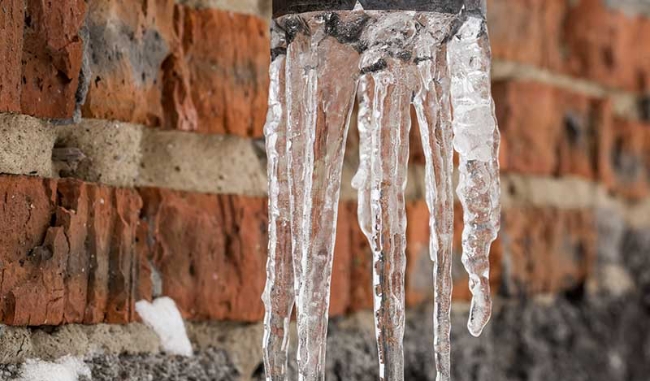Ways to Safeguard Plumbing System from Freezing: Critical Advice
Ways to Safeguard Plumbing System from Freezing: Critical Advice
Blog Article
Are you currently trying to locate info around How to prepare your home plumbing for winter weather?
:strip_icc()/snow-outdoor-faucet-pipes-4af65d1e5e904fb1aa7bf74071fe5d89.jpg)
Cold weather can damage your pipes, particularly by freezing pipes. Right here's just how to prevent it from occurring and what to do if it does.
Intro
As temperatures drop, the threat of frozen pipes boosts, potentially leading to pricey repair work and water damages. Comprehending how to avoid frozen pipelines is essential for home owners in chilly environments.
Prevention Tips
Protecting vulnerable pipes
Wrap pipes in insulation sleeves or utilize warm tape to secure them from freezing temperature levels. Concentrate on pipelines in unheated or outside locations of the home.
Home heating methods
Keep interior areas sufficiently heated up, particularly areas with plumbing. Open up closet doors to permit cozy air to distribute around pipes under sinks.
Just how to recognize icy pipes
Look for lowered water circulation from faucets, uncommon odors or sounds from pipes, and visible frost on subjected pipes.
Long-Term Solutions
Architectural changes
Consider rerouting pipelines far from outside walls or unheated locations. Add added insulation to attics, basements, and crawl spaces.
Upgrading insulation
Invest in top notch insulation for pipelines, attic rooms, and walls. Appropriate insulation assists maintain consistent temperatures and reduces the risk of icy pipelines.
Securing Outside Plumbing
Yard tubes and outside faucets
Separate and drain pipes garden hoses prior to wintertime. Install frost-proof faucets or cover outside taps with protected caps.
Understanding Icy Pipes
What creates pipes to ice up?
Pipes ice up when exposed to temperature levels below 32 ° F (0 ° C) for prolonged durations. As water inside the pipes ices up, it expands, putting pressure on the pipe wall surfaces and possibly creating them to break.
Dangers and damages
Frozen pipes can lead to water system interruptions, residential property damages, and costly repairs. Ruptured pipelines can flood homes and cause considerable architectural damage.
Indicators of Frozen Water Lines
Identifying frozen pipelines early can stop them from bursting.
What to Do If Your Pipes Freeze
Immediate actions to take
If you think icy pipes, keep faucets available to relieve pressure as the ice thaws. Make use of a hairdryer or towels soaked in warm water to thaw pipelines gradually.
Conclusion
Stopping frozen pipes calls for positive steps and fast actions. By understanding the reasons, indications, and safety nets, house owners can protect their pipes during cold weather.
5 Ways to Prevent Frozen Pipes
Drain Outdoor Faucets and Disconnect Hoses
First, close the shut-off valve that controls the flow of water in the pipe to your outdoor faucet. Then, head outside to disconnect and drain your hose and open the outdoor faucet to allow the water to completely drain out of the line. Turn off the faucet when done. Finally, head back to the shut-off valve and drain the remaining water inside the pipe into a bucket or container. Additionally, if you have a home irrigation system, you should consider hiring an expert to clear the system of water each year.
Insulate Pipes
One of the best and most cost-effective methods for preventing frozen water pipes is to wrap your pipes with insulation. This is especially important for areas in your home that aren’t exposed to heat, such as an attic. We suggest using foam sleeves, which can typically be found at your local hardware store.
Keep Heat Running at 65
Your pipes are located inside your walls, and the temperature there is much colder than the rest of the house. To prevent your pipes from freezing, The Insurance Information Institute suggests that you keep your home heated to at least 65 degrees, even when traveling. You may want to invest in smart devices that can keep an eye on the temperature in your home while you’re away.
Leave Water Dripping
Moving water — even a small trickle — can prevent ice from forming inside your pipes. When freezing temps are imminent, start a drip of water from all faucets that serve exposed pipes. Leaving a few faucets running will also help relieve pressure inside the pipes and help prevent a rupture if the water inside freezes.
Open Cupboard Doors
Warm your kitchen and bathroom pipes by opening cupboards and vanities. You should also leave your interior doors ajar to help warm air circulate evenly throughout your home.

I have been very drawn to Preventing and dealing with frozen pipes and I'm hoping you appreciated the piece. Appreciated our write up? Please share it. Help other people find it. Thanks for taking the time to read it.
Schedule Now Report this page